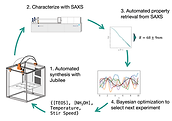
Research & Initiatives
The Pozzo Research Group focuses on control and optimization of material structures for applications in alternative energy, synthesis, separations, medicine, and more. We work to accelerate the discovery and screening of novel materials through the utilization of machine learning, high throughput analysis, automation of laboratory procedures, and advanced characterization using small angle x-ray and neutron scattering.
Project Overviews
Read our posters, websites or visual abstracts on our research projects by clicking on the pictures!
Conjugated Polymer Morphologies
Using X-ray scattering, we examine the phase separated structure of an elastomeric tri-block matrix polymer as well as changes in the spacing and structure that occur with the addition of a conjugated polymer.
Organic Mixed Ionic Electronic Conductors
Investigating how solution conditions and polymer architecture affect the structure and properties of organic mixed ionic electronic conductors (OMIECs) through high-throughput experimentation.
Open Materials Acceleration Platforms
We are developing high-
throughput workflows based on open hardware for the exploration of soft matter systems involving
large chemical design spaces.
Applications of HT Scattering in Material Discovery
High-Throughput scattering characterization can be combined with AI/ML and automation to create a closed loop design that explores large experimental design spaces.
Shape-based data representations for experimental spectra
Analysis of Peptide-Driven Nucleation and Growth of Au Nanoparticles
Materials acceleration platforms require processing experimental data with functional forms. We present shape based data representations using a function space framework to encode domain knowledge and make abstract information available.
Evaluating how molecular design choices of sequence defined molecules impact nanoparticle synthesis is complex because of the scale of the design space. We present a functional data analysis method for comparing the effects of different peptides on gold nanoparticle structure.

Morphological optimization of silica nanoparticles with an autonomous experimentation
Science Jubilee: an open-science, multi-tool motion platform for materials science automation
Developing autonomous synthesis capabilities to synthesize silica nanoparticles via a Stöber sol-gel process and characterize their size, polydispersity, and pore structure with small angle X-ray scattering.
Developing open-hardware and open-software self-driving labs using low-cost and accessible automation.
Science Jubilee aims to be a flexible solution for automating materials science.
Check it out on GitHub




